| A Spotlight of Decherd's History |
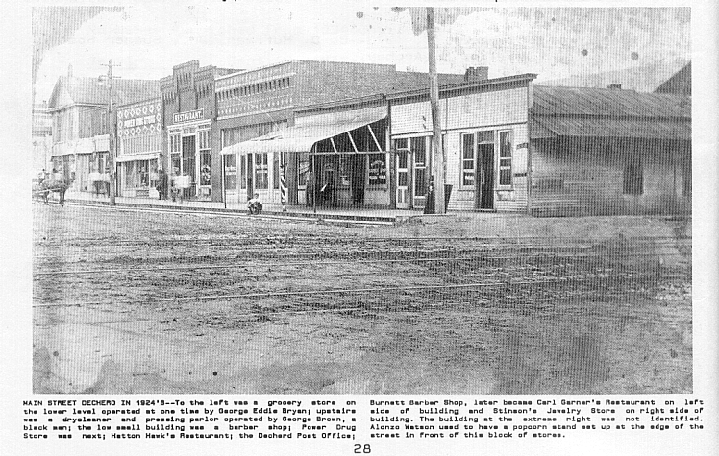 |
| Downtown Decherd 1924 |
|
|
HISTORY OF DECHERD
History is an ongoing project. Yesterday is in the past and it becomes a part of history. The town of Decherd is not different than others. Founded in the mid 1800's its heritage is rich, its memories crowd the pages of out minds. Farming and education, railroads and industry have flourished. Today, Decherd stands as an industrious town, but with a potential still not realized.
Like so many Middle Tennessee towns, Decherd owes its beginning to the Nashville and Chattanooga Railroad which was completed in 1851 through what was to become the town of Decherd.
Mac Deaver, writing in THE HERALD-CHRONICLE'S Bicentennial edition of July 01, 1976 pointed out that Peter S. Decherd, for whom the town was later named, gave rights-of-way to the railroad company with the provision that a depot be located near the "Decherd plantation" where the present town was built.
A Virginia native Mr. Decherd came to Franklin County in the early 1800's and became a prosperous farmer. In 1831, he moved from Winchester to a large tract of land about two miles to the northwest. He and his brothers developed the land into the plantation.
When the N&C Railroad was completed through the area, the log cabin of Richard Holder was the only other home there. But soon after the railroad's completion, new settlers came and the community grew into a popular stopping point for railroad travelers.
The Davidson House, a hotel built by Dan Champion ( could have been the same as Decherd Hotel), during the final days of railroad construction, Became known throughout the South by individuals who for business reasons were forced to spend an evening or two in the community waiting for rail transportation. Among setters who came and stayed in Decherd were William Simons, who constructed one of the very first homes there, and Simpson West, and families of Martins, Tuckers, and Lynches.
With the railroad in operation, the town began to develop as a shipping point for farm goods, as well as people. Such things as poultry, eggs, nursery stock and other farm products were shipped in abundance by the railroad from Decherd.
|
CIVIL WAR PERIOD
The Civil War naturally dominated life in Decherd when it broke out in 1860 as it did in every other community. Though no major battles were fought in Decherd, many Federal and Confederate movements were noted in the area and was the site of several skirmishes over control of the railroad and Elk River.
Federal General Don Buell established headquarters in Decherd in August of 1862, before moving North to encounter Confederate forces under the command of General Braxton Bragg.
Later in 1863, Federals under Colonel John T. Wilder, drove a Confederate force from Decherd and destroyed about 300 yards of the vital railroad between Decherd and Cowan. Telegraph and commissary stores of the Southern forces were burned in the raid.
Following the war, Decherd struggled to regain its composure and continue its growth.
By 1900 Decherd had a population of about 1000. Originally incorporated in 1868, the town was chartered by the General Assembly on April 22, 1901. Bedford C. McGill became mayor in June of that year.
From 1885 to 1901, the town was not officially incorporated due to the "Four Mile Law," which allowed for the selling of liquor within four miles of schools in incorporated communities only. So Decherd, as did Winchester and other surrounding towns, chose to be unincorporated for a period of time.
As the Twentieth Century approached, Decherd was a thriving community. A description of the town in an 1890-91 issue of the Tennessee State Gazetteer and Business Directory described the town in this manner:
"It contains on flour mill, cotton press and grist mill' one hotel, two churches-Presbyterian and Christian-a fine college, lately created and two free schools-one white and the other colored. Population 1000."
With the start of the 1900's, Decherd's fame as a shipping and processing point for agricultural products grew. Cotton and Irish potatoes are remembered as the most significant crops in the town's past history.
Cotton ginning developed in Decherd during the "heyday" of cotton production in Franklin County. With the decline of cotton growth in the area, the ginning business ended in the 1960's.
|
POTATO BUSINESS
Two large "potato houses" did a thriving business in Decherd in the 1930's and 1940's. Loads of Irish potatoes were brought to the houses, graded, sacked and shipped by rail to big markets in northern states. A common sight during the period, as recalled by some old-timers who still remain, was a row of potato trucks or wagons stretching through the downtown area of Decherd.
Mrs. Pauline Rudder of Decherd remembers both the cotton and the potato business very well. Mrs. Rudder and her husband, Wallace, came to Decherd in 1940 and constructed a cotton gin. The Rudder gin, which ceased operation in 1968, was located in the southern section of the town.
Glenn Swann was Mr. Wallace's partner in the potato business. The two operated a highly successful potato house in Decherd for about 15 years. They purchased a business previously operated by Ben Heikens. E. P. Goodman was the owner of another successful house for the processing of potatoes during the same period.
The late Mr. Swann, who also grew over 100 acres of potatoes himself during the period, was a lifelong resident of Franklin County. He, oft times, would refer to himself and the other potato growers as "the potato kings."
After its re-incorporation in 1901, Decherd became an attractive location for industry.
|
FIRST EARLY INDUSTRIES
The garment industry has occupied a dominant role among industries located in Decherd.
Lanier Clothes located in the town in 1972-73 and commenced its manufacturing of men's sport coats. The company continues its operation and has constructed a gigantic warehouse in the Franklin County Industrial Park. Lanier remain as one of the county's leading employers.
Decherd-Franklin Corporation, another clothing industry, came to Decherd in 1957 and commenced operation with about 30 workers. At peak production this company was employing more than 300. The company ceased operations about 1980. The building remains in Decherd and at this time is leased by Monterey Mills of Cowan.
Decherd is also the home of Commercial Nursery, Interstate Block Company and Decherd Marble and Granite.
Today, Decherd and Winchester share a common boundary near Waggoner's Creek, as the result of annexations.
The town's population has been established as 2500, two and a half times as large as it was at the begging of the century.
The town's top boast is its city park, which includes a playground, baseball field, a flag pole, pavilion and the cornerstone from the old Terrill College. About 2000 bricks from the old college building have been used in the construction of several of the park's facilities.
There are two schools in Decherd today. The newest is Decherd Elementary which teaches students in kindergarten and elementary grades, one through six.
H. Lewis Scott (North) Junior High was constructed in 1968 on the Estill Springs Highway and at the time of its construction was part of the county's new junior high program for grades seven, eight, and nine.
Hillcrest School, which operated as a training center for mentally retarded children, operated in Decherd for many years, but was closed down when other facilities became available for such training.
Civic organizations are far from abundant in Decherd, but its citizens take part in numerous civic activities located in other parts of Franklin County. The long-standing Decherd Loins Club is the only true civic group in the town. There is a Masonic Lodge and several church and school organizations.
A long-standing priority, which has been a constant goal for Decherd, is the correction of the flooding problem that exists in the area of North Second and Floyd Streets. Many of these problems have been elevated.
|
This short history of Decherd is written from the mayor's memory, from information gained by looking through old records, and from talking to citizens of Decherd who have kept old records, and pictures of happenings down through the years.
Some of the information could be questionable but, for the most part, it is authentic.
Located on the Nashville, Chattanooga and St. Louis Railroad, now the Louisville and Nashville Railroad, Decherd had its origin with the building of the railroad in 1851.
The town was named after Peter S. Decherd, one of the early influential citizens of Franklin County. Carroll Walker , John March, Aaron Lynch and Cyrus Barnes were among the first settlers and merchants of the town.
In 1886, the accounts give us the information that the town contained three general stores, one drug store, a steam grist mill, a flour mill, a blacksmith shop, a mechanical shop, two churches and a public school. The town prospered and on April 22, 1901 it was incorporated.
The railroad played an important part in the prosperity of Decherd. It became the terminal for branch lines going to Huntsville, AL., Fayetteville, Lewisburg and Columbia, TN. Several trains left Decherd each day going to these towns over the branch lines, including two passenger trains.
There was a large hotel across from the railroad where people spent the night waiting to go places on the trains. Salesmen, or drummers as they were called then, used the hotel as headquarters for selling their wares and for making connections to different towns in this part of the state.
At one time there were eight passenger trains stopping at Decherd on the main line of the NC&St.L Railroad. The branch line trains waited on the main line trains for passengers, express and freight. It was a tremendous business and many of our people had good jobs on the railroad and at the depots.
During the Civil War, Decherd played an important role as a concentration center for both Union and Confederate Forces. There were sketches made of General Buell's (a Union general) camp at Decherd in 1862 showing the railroad depot, some stores and other building. A train was shown in front of the depot. One of the sketches was by Mr. Hubner in Harper's Magazine of Sept. 20, 1862.
In 1890, James W. Terrill, with the help of the local citizens, built and established Terrill College on the site where the Decherd Public School is now standing. The college closed in 1903 because of a lack of interest in higher education.
The high school and grade schools were consolidated in the same building until 1949 when Central High School at Decherd were consolidated into the present senior high school on the Decherd Boulevard in Winchester.
As mentioned before, Decherd was incorporated April 22, 1901. A Mr. J. F. McGill became the first mayor and R. Ross Powell was the first recorder. The town had one policeman for many years. In the beginning he was called the Town Marshal.
According to the records, during the first 10 years, some 57 ordinances were passed by the town council, supplementing and strengthening the charter of the city.
Forty-three of these ordinances were passed the first year after the charter was approved by Governor Benton McMillin. Many ordinances have been passed since that time--several of these were for the purpose of changing the boundaries of the town, always growing larger.
During World War II, a new road was built connecting Highway 64 with 41A leading to camp Forrest, which was located out from Tullahoma. Part of the camp was in Coffee County and part in Franklin County. This highway named Decherd Boulevard from Winchester to Decherd caused a tremendous change in business locations, both for Decherd and Winchester.
|
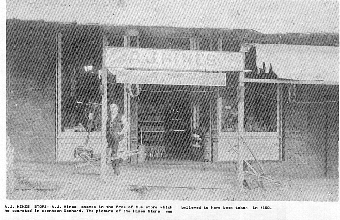 |
| A. J. Hines Store 1890 |
|
|
 |
| Decherd Cash Grocery 1950 |
|
|
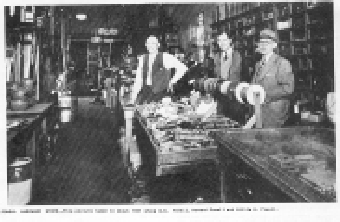 |
| Powell Hardware Store (unknown date) |
|
|
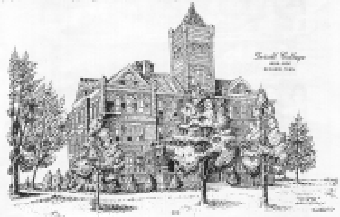 |
| Terrill College (located in Decherd) |
|
|
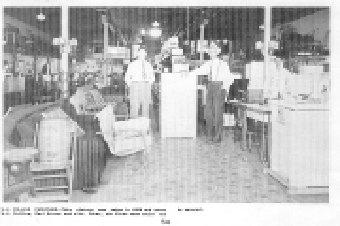 |
| W. W. Collins Furniture Co. (unknown date) |
|
|
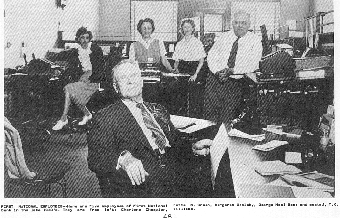 |
| Decherd Bank Employees (unknown date) |
|
|
|